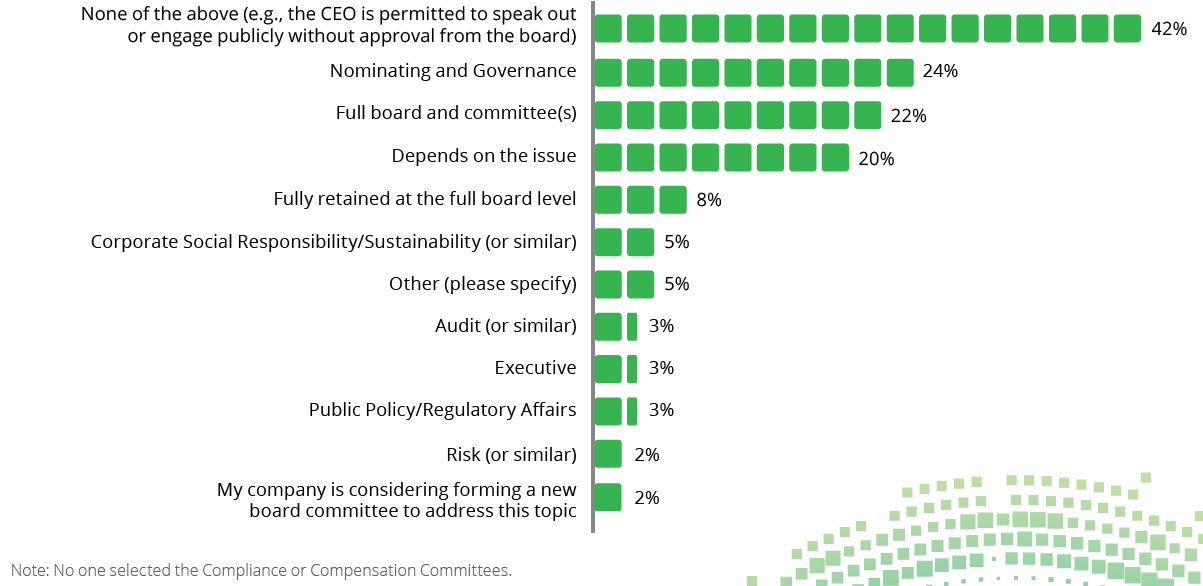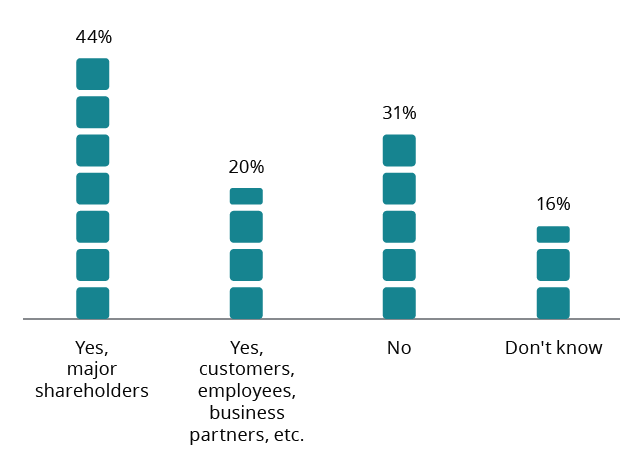Natalie Cooper is Senior Manager and Robert Lamm is an independent senior advisor, both at the Center for Board Effectiveness, Deloitte LLP; and Randi Val Morrison is Vice President, Reporting & Member Support at the Society for Corporate Governance. This post is based on a Deloitte/Society for Corporate Governance memorandum by Ms. Cooper, Mr. Lamm, Ms. Morrison, Debbie McCormack, Carey Oven, and Darla C. Stuckey.
Corporate leaders are increasingly speaking out on potentially controversial social, political, and environmental issues as a matter of principle and/or in response to changing stakeholder pressures and expectations that corporate America can influence the dialogue on these issues. As is the case with many other corporate practices, taking a stance publicly on controversial or sensitive topics poses both risks and opportunities, including alienating or appealing to key stakeholders; enhancing or damaging the corporate culture; and eroding or building trust and brand reputation. As a result of these dynamics, many corporate leaders and boards of directors are considering—in many cases, for the first time—whether and how their companies should approach public engagement on these issues.
This post looks at how companies approach public engagement on social, political, environmental, or public policy issues and the related role of the board. It presents findings from a July 2021 survey of in-house members of the Society for Corporate Governance that addressed, among other matters, designation of a company spokesperson; governing documentation; the role of management; board oversight and practices; and stakeholder engagement.
Findings
Respondents, primarily corporate secretaries, in-house counsel, and other in-house governance professionals, represent public companies (90%) and private companies (10%) of varying sizes and industries. [1] The findings pertain to all companies, public and private. Where applicable, commentary has been included to highlight differences among respondent demographics. The actual number of responses for each question is provided.
Access results by company size and type.
Over the past year, has your CEO or any other officer or director made any public statement on any political, social, environmental, or public policy matter (e.g., voting legislation, transgender rights, racial justice, immigration policies, gun violence), either in response to events or proactively, on the company’s behalf? Select all that apply. (115 responses)
Both private and public companies reported that their company leadership made public statements on a political, social, environmental, and/or public policy matter. This was most often seen at large-cap companies (66%) compared with mid-caps (41%), small-caps (7%), and private companies (50%). Racial justice was the most common topic addressed, followed by social justice and environmental issues.

Indicate who is your company’s designated spokesperson(s) if/when the company decides to speak out or engage publicly on social, political, environmental, or public policy issues? Select all that apply. (110 responses)
Among public companies, the CEO is most often the designated spokesperson, representing 66% of all public companies, followed by the corporate communications head or similar (30%). One-third of public companies reported that the spokesperson was chosen depending on the issue. Nearly 30% of small-caps said they do not have a designated spokesperson. Among private companies, 50% identified the CEO, and 50% reported the corporate communications head or similar, as the designated spokesperson; another 30% said the spokesperson was dependent upon the issue.
Other spokespersons reported included the investor relations head or similar, CFO, board chair, chief diversity officer, government relations or government affairs officer, and marketing director.

Which document or policy governs or specifies whether or when your company leadership is allowed to speak out or engage publicly on social, political, environmental, or public policy issues on the company’s behalf? Select all that apply. (105 responses)
A plurality (about one-third) of all public companies reported having a company-specific framework. Private company respondents most commonly reported having a company-specific framework and/or the code of ethics (40% each). Other types of documents and policies reported included corporate governance guidelines, disclosure policies and guidelines, and communications and social media policies and guidelines.
The document or policy is board-approved at about 15% of large- and small-cap companies, 3% of mid-caps, and 20% of private companies. Fewer than 5% of large- and mid-caps and none of the small-caps reported that the document or policy addresses board involvement, compared with 20% of private companies.
About 30% of respondents overall reported that their company does not have such a document or policy, although 13% of public companies and 10% of private companies are considering it.

Describe the role of any management-level committee, group, or individual(s) that oversees the CEO or other leadership speaking out or engaging publicly on social, political, environmental, or public policy issues on the company’s behalf. Select all that apply. (95 responses)
Among public companies, 70% of large-caps and 63% of mid-caps have a management-level committee, group, or individual(s) overseeing this area, compared with 21% of small-caps. 44% of private companies reported having such a committee (or similar).
For companies with a management-level committee (or similar), the most common responses relating to their roles were:
Large-caps:
- To assess potential benefits and risks associated with taking a position on a certain issue […]
- To determine which issues are connected to the company’s interests and core corporate values
- To determine which issues the company should consider taking a position on […]
Mid-caps:
- To determine which issues are connected to the company’s interests and core corporate
values - To assess and prepare the company’s response to an issue
Small-caps:
- To assess and prepare the company’s response to an issue
- To determine which issues the company should consider taking a position on […]
- To seek broad consensus internally, as appropriate
- To assess and manage the impact once a position is taken […]
Private companies:
- To assess potential benefits and risks associated with taking a position on a certain issue […]
- To determine which issues the company should consider taking a position on […]

Over the past year, has your company’s board or any of its committees discussed whether and/or when the company or any of its officers or directors should speak out on the company’s behalf on political, social, environmental, or public policy matters? (97 responses)
At public companies, 45% of large-caps reported yes, compared with 34% of mid-caps and 14% of small-caps. Among private companies, 44% responded yes. Another roughly 10% of public companies reported that this topic is under consideration and/or on the agenda of an
upcoming board or committee meeting; this was 11% for private companies.

Which of the following board committees has oversight of the CEO or other leadership speaking out or engaging publicly on the company’s behalf on social, political, environmental, or public policy issues? Select all that apply. (92 responses)
The most common response for public companies was none of the above at 45%, followed by the nominating and governance committee at 25%. Further, 20% identified the full board and committee(s), and another 20% reported that oversight is issue-dependent. For private companies, the full board and committee(s) most commonly have oversight (one-third), followed by none of the above at 22%.

Where is board/committee oversight memorialized? Select all that apply. (74 responses)
Most companies memorialize board/committee oversight in committee charters (57% for public
companies and 56% for private companies) and corporate governance guidelines (42% for public
companies and 44% for private companies).

Have any of your company’s stakeholders contacted or requested to engage with management, the board/board committee, or individual directors on any political, social, environmental, or public policy matters in the past year? Select all that apply. (89 responses)
About half (49%) of public companies responded that their major shareholders contacted or requested to engage with management, the board/board committee, or individual directors (68% large-caps; 28% mid-caps; 38% small-caps), and 18% of public companies reported having been contacted or requested to engage by customers, employees, business partners, etc. (26% large-caps; 7% mid-caps; 15% small-caps) on a political, social, environmental, or public policy matter in the past year. 44% of private companies said that their customers, employees, business partners, etc., had contacted them or requested such an engagement on these issues.
The most frequently cited topics for which stakeholders contacted or requested engagement with management, the board/board committee, or individual directors included ESG, climate change, and DE&I; some cited lobbying, legislative initiatives, and political contributions.

Endnotes
1Public company respondent market capitalization as of December 2020: 50% large-cap (which includes mega- and large-cap) (> $10 billion); 37% mid-cap ($2 billion to $10 billion); and 13% small-cap (includes small-, micro-, and nano-cap) (<$2 billion). Private company respondent annual revenue as of December 2020: 42% large (> $1 billion); 17% medium ($250 million to $1 billion); 33% small (<$250 million); and 8% not able to share. Respondent industry breakdown: 33% consumer; 29% energy, resources, and industrials; 22% financial services; 9% life sciences and health care; and 7% technology, media, and telecommunications. Throughout this post, in some cases, percentages may not total 100 due to rounding and/or a question that allowed respondents to select multiple choices.(go back)
 Print
Print